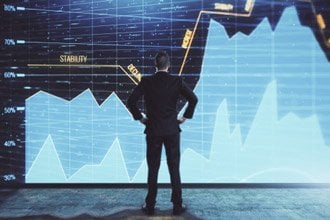The Dow Jones Industrial Average began March 9 (Monday) with a 2,000-point loss on coronavirus fears. The 7% plunge brought all trade to a halt for 15 minutes.
A lot of investors are shaking in their boots right now. But does a trading halt mean the stock market is crashing?

NYSE President Stacey Cunningham explained the measure was "designed to slow trading down for a few minutes, to give investors the ability to understand what's happening in the market."
She framed it as a moment for investors to digest information and make more rational decisions. Rather than a trigger for panic, it should prompt reflection.
And if that's the only purpose of a stock market circuit breaker, Cunningham is absolutely right.
But the takeaway from this can't be "everything is fine." Because it's not.
Here's why trading paused this morning, what it means for investors, and what you should do about it in the coming weeks.
Why Did the Market Halt Trading?
It might be comforting to know that trading halts have a history. And they are even tested on the exchange every quarter.
The U.S. Securities and Exchange Commission created "circuit breakers" for the market after Black Monday in October 1987, when the Dow lost 22.6%. It was to prevent markets from spiraling out of control on momentary panic.
A "Tier 1" or "Level 1" circuit breaker, the kind that happened today, halts trading for 15 minutes if the market falls more than 7% before 3:25 p.m.
If the market were to drop 13%, it would be a "Level 2," which would also halt trading for 15 minutes. A "Level 3" stoppage would take place on a 20% drop, and trading would be suspended for the entire day.
Now, this was only a Level 1. And the loss is still hovering around 7% on the day.
But what does this event say about the confidence of investors and policymakers? Should we be scared of the coming weeks?
You're probably hearing a lot of different voices on this right now. So let's put it to rest.
Here's how you should think about the market right now.
Is the Stock Market Crashing?
No, it's not time to panic.
But let's not take for granted the "nerves of steel" required to act rationally in this moment - or if things get worse.
Not panicking doesn't mean ignoring the ugly reality of a 7% market drop. It means using it to your advantage.
The best thing for you to do right now is step back and try to get a lay of the land. Think about what you know, and don't obsess over what you don't know.
Right now, there are two things you know for certain about broad market conditions:
- The market is not broken.
U.S. Treasury Secretary Steve Mnuchin said last week there would be no need for the SEC to step in with added trade-halt measures. He said we have "all the proper circuit breakers in place." We learned today that automated stops are working as they should. We are not yet in "free fall" territory.
- Volatility is way up.
The CBOE Volatility Index (VIX) shot up more than 40% this morning, from 48 to 59. The 2019 VIX average was 15.39. So above 50 is really high, pointing to more uncertainty than we've seen at any point over the last 10 years. That means options prices today reflect a lot of fear in the markets.
Those are the two clear knowns.
Higher volatility means the market will see bigger swings than normal as global fears of coronavirus spread. Panicked policy disagreements like the oil price war between OPEC and Russia - so far dropping U.S. crude prices to a four-year low of $27.34 (-34%) - may create ripples.
But the market is still functioning as expected. And that can be a comfort to investors seeking opportunities in the downturn.
In fact, there are things you can do to protect your money right now - and possibly even make more money down the road.
Take it from Money Morning Chief Investment Strategist Keith Fitz-Gerald and Founding Editor Bill Patalon...
How to Protect Your Money from the Coronavirus Panic
[mmpazkzone name="in-story" network="9794" site="307044" id="137008" type="4"]
Bill Patalon explains that you can "use pullbacks to accumulate good wealth plays" that you would expect to hold for a while. He calls it the "Go-Long/Buy-Good" strategy.
"You establish a foundational position in the stocks you like - and then add to those holdings on pullbacks or as you get more cash," he says.
Keith Fitz-Gerald agrees.
"Most people don't think this way, but remember how the game is played. You buy low and sell high," Keith says. "So believe it or not, what you want to do is buy in on big down days, knowing full well that volatility cuts both ways."
"That takes nerves of steel, because nobody knows when the markets are going to rebound. But we do know that history is very clear that they will. It's a function of growth, not headlines."
Keith always urges his readers to keep a list of "must have" stocks nearby.
Another choice is safe havens.
If you need stability right now and can't afford to take any losses on stocks, gold is a great choice.
You don't want to put all of your money in precious metals, but a small allocation between 2% and 5% is a good balance to volatile stocks.
At Money Morning, we like the SPDR Gold Trust ETF (NYSE: GLD). It's liquid, reliably tracks the price of gold, and has a low fee structure. You get the benefit of owning gold without the inconvenience.
Another profitable strategy is options trading. In the last week, we've shown readers two options strategies that resulted in gains of 500% and 350%. We've just released another today as well. Click here for more information.
Follow Money Morning on Facebook and Twitter.
About the Author
Mike Stenger, Associate Editor for Money Morning at Money Map Press, graduated from the Perdue School of Business at Salisbury University. He has combined his degree in Economics with an interest in emerging technologies by finding where tech and finance overlap. Today, he studies the cybersecurity sector, AI, streaming, and the Cloud.



